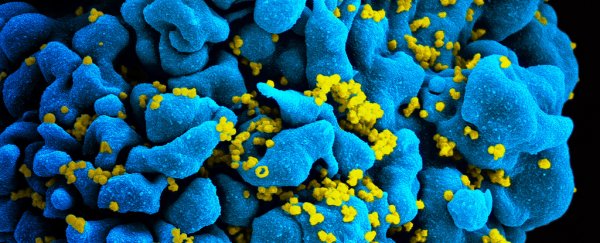The first of 50 patients to complete a trial for a new HIV treatment in the UK is showing no signs of the virus in his blood.
The initial signs are very promising, but it's too soon to say it's a cure just yet: the HIV may return, doctors warn, and the presence of anti-HIV drugs in the man's body mean it's difficult to tell whether traces of the virus are actually gone for good.
That said, the team behind the trial – run by five British universities and the UK's National Health Service – says we could be on the brink of defeating HIV (human immunodeficiency virus) for real.
"This is one of the first serious attempts at a full cure for HIV," Mark Samuels, Managing Director of the National Institute for Health Research Office for Clinical Research Infrastructure, told Jonathan Leake at The Sunday Times.
"We are exploring the real possibility of curing HIV. This is a huge challenge and it's still early days but the progress has been remarkable."
HIV has long proved very difficult to treat because the disease can hide in dormant cells where the immune system can't get to it.
This new therapy is the first aimed at destroying HIV in every part of the body, and it works by combining a drug that reactivates these dormant HIV cells with a vaccine designed to help the immune system find and kill them.
The vaccine is given to patients first, boosting the immune system's ability to detect and combat HIV-infected cells. Then, a drug called Vorinostat is used, activating the dormant HIV cells left over, so the immune system can fight them too.
It's as though the infected cells suddenly step out from their hiding place, and the newly boosted immune system can then pick them off.
Standard antiretroviral drugs in use today are effective at stopping HIV from reproducing and can keep the virus at bay, but are unable to kill it off altogether.
But the drug combination being used in this trial – which is being tested on 50 HIV patients – could mean we have a more effective treatment on our hands.
The unnamed 44-year-old man who is currently showing no sign of the virus in his blood is the first to finish the trial. In a few months, when the antiretroviral drugs wear off from him and the other participants in the study, we should have a better idea of whether the HIV has truly disappeared.
If the 44-year-old indeed has no traces left of HIV, it would mean he is only the second person to ever be cured of the disease, which affects some 37 million people around the world.
To date the only person considered to have been cured of HIV is American Timothy Ray Brown, who was given a bone marrow transplant from a donor known to be resistant to HIV. The stem cells he was given rebuilt his immune system, eradicating both the HIV and his acute myeloid leukaemia at the same time.
But that kind of treatment is too specific, too costly, and too dangerous to be used widely, which is why this new trial is causing a lot of excitement.
However, nobody's taking anything for granted yet, including the male patient.
"I took part in the trial to help others as well as myself," he told The Sunday Times.
"It would be a massive achievement if, after all these years, something is found to cure people of this disease. The fact that I was a part of that would be incredible."
Watch this space.
